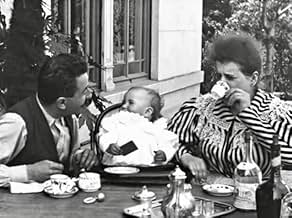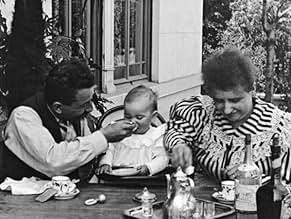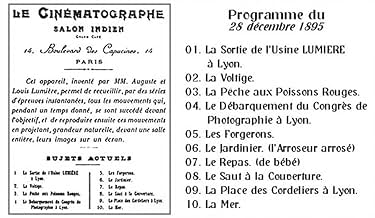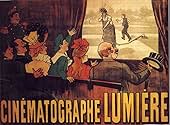Repas de bébé
- 1895
- 1m
IMDb RATING
5.9/10
3.7K
YOUR RATING
As part of a maiden public film screening at the Salon Indien, on December 28, in Paris, Auguste Lumière pivots the centre of attention around his baby daughter, as he tries to feed her from... Read allAs part of a maiden public film screening at the Salon Indien, on December 28, in Paris, Auguste Lumière pivots the centre of attention around his baby daughter, as he tries to feed her from a spoon.As part of a maiden public film screening at the Salon Indien, on December 28, in Paris, Auguste Lumière pivots the centre of attention around his baby daughter, as he tries to feed her from a spoon.
Featured reviews
On a cold day of December in 1895, two photo technicians named Auguste and Louis Lumière rented the Salon Indien Du Grand Café to show the results of a series of experiments they had been making since 1892. As workers of their father's photographic firm, their work in the development of better process to make photographs wasn't unknown, but what the brothers showed to their limited audience that day was far beyond what anyone could have imagined. On that day, cinema was born, as the brothers' invention, the Cinématographe, allowed to project moving images on a screen, a considerable improvement over the popular Kinetoscope (which showed the images through a peephole). As photographers themselves, the brothers considered their invention to be the natural evolution of photography, so most of the movies they showed that day were done to show the idea that like photography, cinema was here to capture memories, albeit in a more vivid way.
Of the 10 short films the brothers screened on that historical day, most were of course devised to show the movement of the images (people walking, exercising, or simply the traffic passing on the street), but the others had specific purposes to show the brothers' ideas of what kind of uses give to the new invention. One was of course the shooting of the arrival of the Congress of Photographers in Lyon, aimed to show cinema as a new way to document history; there was also "L'Arroseur Arrosé", which showed cinema as a way to tell a simple and fun little story; and finally, there were the movies that, like photographs, captured family moments. "Repas De Bébé" (literally, "Baby's Meal") was one of that kind of movie, as the film showed Auguste Lumière and his wife Marguerite, while they are having breakfast with their baby daughter Andrée.
While one could even say that the movie doesn't have anything special besides the fact that it was among the first movies screened in history; "Repas De Bébé" is probably the movie that represents the Lumières' ideal of cinema the most, as like a photography, the movie captures a charming moment in the life of a family that can be revisited anytime, with the advantage of having it moving. This meant that we could not only remember how persons looked in the past, we were now able to see how they behaved, what they did or simply how they really lived. It was more than a documentary or an actuality film, this was essentially a memory being caught on film and saved for posterity. One can make the argument that film videos were born with this movie, and for that reason alone, "Repas De Bébé" has a special place in the history of film. 6/10
Of the 10 short films the brothers screened on that historical day, most were of course devised to show the movement of the images (people walking, exercising, or simply the traffic passing on the street), but the others had specific purposes to show the brothers' ideas of what kind of uses give to the new invention. One was of course the shooting of the arrival of the Congress of Photographers in Lyon, aimed to show cinema as a new way to document history; there was also "L'Arroseur Arrosé", which showed cinema as a way to tell a simple and fun little story; and finally, there were the movies that, like photographs, captured family moments. "Repas De Bébé" (literally, "Baby's Meal") was one of that kind of movie, as the film showed Auguste Lumière and his wife Marguerite, while they are having breakfast with their baby daughter Andrée.
While one could even say that the movie doesn't have anything special besides the fact that it was among the first movies screened in history; "Repas De Bébé" is probably the movie that represents the Lumières' ideal of cinema the most, as like a photography, the movie captures a charming moment in the life of a family that can be revisited anytime, with the advantage of having it moving. This meant that we could not only remember how persons looked in the past, we were now able to see how they behaved, what they did or simply how they really lived. It was more than a documentary or an actuality film, this was essentially a memory being caught on film and saved for posterity. One can make the argument that film videos were born with this movie, and for that reason alone, "Repas De Bébé" has a special place in the history of film. 6/10
This film, along with nine other films, was shown at a Paris, mini-film festival, by pioneering filmmakers, the Lumiere brothers, in December of 1895. The seventh film ever shown to a paying audience, ends up being the first sequel too, when August Lumiere brings his kid back out for lunch time with the wife. They are both the main subjects in an earlier Lumiere film, shown about two minutes before this one, Fishing For Goldfish (1895). Watching this during a mini-festival in 1895 probably didn't register as a sequel. But looking back at it 130 years later, it is a prime, early example of a sequel. The baby must have tested well during all the test screenings. This is what is so cool watching films from the pioneering era of film.
7.8 (B- MyGrade) = 8 IMDB.
7.8 (B- MyGrade) = 8 IMDB.
I watched this film on a DVD that was rammed with short films from the period. I didn't watch all of them as the main problem with these type of things that their value is more in their historical novelty value rather than entertainment. So to watch them you do need to be put in the correct context so that you can keep this in mind and not watch it with modern eyes. With the Primitives & Pioneers DVD collection though you get nothing to help you out, literally the films are played one after the other (the main menu option is "play all") for several hours. With this it is hard to understand their relevance and as an educational tool it falls down as it leaves the viewer to fend for themselves, which I'm sure is fine for some viewers but certainly not the majority. What it means is that the DVD saves you searching the web for the films individually by putting them all in one place but that's about it.
Anyway onto this film which is barely even a minute long and focuses on two parents feeding their baby. It is an affectionate and tender shot that is free of anything of particular interest but is still quite engaging. Clearly made as part of the developmental process of getting to grips with the technology, the film doesn't aim for much but in regards its place in history it is maybe worth a look at. Lumière is considered the originator of cinema, so on that basis alone it is worth a glance. Don't expect to be able to understand the impact of the film though to those of us now used to seeing different universes on our screens when we go to the cinema, it is difficult to forget that you'll looking at two people feeding a baby!
Anyway onto this film which is barely even a minute long and focuses on two parents feeding their baby. It is an affectionate and tender shot that is free of anything of particular interest but is still quite engaging. Clearly made as part of the developmental process of getting to grips with the technology, the film doesn't aim for much but in regards its place in history it is maybe worth a look at. Lumière is considered the originator of cinema, so on that basis alone it is worth a glance. Don't expect to be able to understand the impact of the film though to those of us now used to seeing different universes on our screens when we go to the cinema, it is difficult to forget that you'll looking at two people feeding a baby!
Repas de bebe (1895)
This early film from Louis Lumiere is pretty simple as a mom and dad are facing the camera with their child sitting between them. They feed the baby. Yep, that's all that happens in this early film but it's a pretty interesting experiment. Of course, this was 1895 so it's silly to try and compare this film to the film's of today. Things were so early at this point that people like Lumiere were just filming whatever they could. If you've got children then this here will obviously appeal to you as it's quite funny to see the baby's reaction to all this food coming its way.
This early film from Louis Lumiere is pretty simple as a mom and dad are facing the camera with their child sitting between them. They feed the baby. Yep, that's all that happens in this early film but it's a pretty interesting experiment. Of course, this was 1895 so it's silly to try and compare this film to the film's of today. Things were so early at this point that people like Lumiere were just filming whatever they could. If you've got children then this here will obviously appeal to you as it's quite funny to see the baby's reaction to all this food coming its way.
Two loving parents feed their happy baby on the perch of their country home. It is often said that these early Lumiere shorts are primitive because they have not yet mastered basic film grammar, such as camera movement, editing or the close-up, films like these being a simple, static set-u;, the camera pointing at the scene from a middle distance. But as filmmakers like Godard, Ozu and Kitano, for instance, realised, that very grammar can be a violation of the integrity of the image, forcing us to concentrate of the structure in which the image is only a unit, rather than the image itself.
There is nothing primitive or simple about this particular image; as critics have noted, this film offers two levels of movement, one human, recognisable, communal (the family); the other (the trees blowing) part of a different order altogether, of nature, cycles, immemoriality. So while the family represents a similar idea of continuity as the trees, of the species being reproduced, it sis also offered in stark contraast to them, as each member of the trio will eventually die, for all the nourishment and fertility, while nature lives on, indifferent.
This frisson of mortality undercuts the film's essential conservatism, and differentiates it from the sinister surveillance of the earlier 'Sortie d'Usine'. This recognition that the powers of the camera-wielding Lumieres are in fact limited, that they are not as omniscient as they once thought they were, is perhaps dramatised in the figure of the father, one of the brothers, one of the first great director-stars, paving the way for Chaplin, Keaton and Welles. His crossing the line from director to star, from passive to active, from subject to object, represents a breach between the observer and observed, a breaking of that invisible line, a destruction of that contract Hollywood will try so desperately to enforce, between reality and fiction. The watcher is now the watched, distinctions and hierarchies have been abolished.
Ironically, immortality has been conversely guarenteed - while the man behind the camera is lost, fading into a mere eye, a role taken over by every viewer, the actor brother is trapped forever in this rigid, simple domestic scenario, feeding the ever-hungry, unthinking baby, a harbinger of the medium he invented.
There is nothing primitive or simple about this particular image; as critics have noted, this film offers two levels of movement, one human, recognisable, communal (the family); the other (the trees blowing) part of a different order altogether, of nature, cycles, immemoriality. So while the family represents a similar idea of continuity as the trees, of the species being reproduced, it sis also offered in stark contraast to them, as each member of the trio will eventually die, for all the nourishment and fertility, while nature lives on, indifferent.
This frisson of mortality undercuts the film's essential conservatism, and differentiates it from the sinister surveillance of the earlier 'Sortie d'Usine'. This recognition that the powers of the camera-wielding Lumieres are in fact limited, that they are not as omniscient as they once thought they were, is perhaps dramatised in the figure of the father, one of the brothers, one of the first great director-stars, paving the way for Chaplin, Keaton and Welles. His crossing the line from director to star, from passive to active, from subject to object, represents a breach between the observer and observed, a breaking of that invisible line, a destruction of that contract Hollywood will try so desperately to enforce, between reality and fiction. The watcher is now the watched, distinctions and hierarchies have been abolished.
Ironically, immortality has been conversely guarenteed - while the man behind the camera is lost, fading into a mere eye, a role taken over by every viewer, the actor brother is trapped forever in this rigid, simple domestic scenario, feeding the ever-hungry, unthinking baby, a harbinger of the medium he invented.
Did you know
- TriviaFilm historians often jokingly refer to this film as the first 'home movie,' as it depicts the filmmaker's home life in a documentary fashion, without any attempt at narrative contrivances.
- ConnectionsEdited into The Lumière Brothers' First Films (1996)
Details
- Release date
- Country of origin
- Language
- Also known as
- Le déjeuner de bébé
- Production company
- See more company credits at IMDbPro
- Runtime1 minute
- Color
- Sound mix
- Aspect ratio
- 1.33 : 1
Contribute to this page
Suggest an edit or add missing content




















